Atlanta, Georgia, USA, 9 October 2013 - When His Holiness the Dalai Lama arrived at the Glenn Memorial Auditorium to spend a day on the Emory University Campus this morning President James Wagner was there to receive him. His first engagement was a meeting with members of the China-Tibet Initiative in a marquee on one of the lawns. A Chinese student gave a brief introduction explaining that initially five students had agreed the need to arrange meetings between Chinese and Tibetan students and that their number has grown to eighty. He said getting to know each other was the most important thing and suggested theirs was a model for conflict resolution among students.
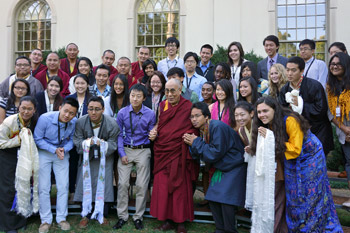
|
His Holiness the Dalai Lama with China-Tibet Initiative members after their meeting at Emory University in Atlanta, Georgia on October 9, 2013. Photo/Jeremy Russell/OHHDL
|
His Holiness greeted the nearly 50 students as brothers and sisters, reiterating his often expressed belief that as human beings we are all the same. He approved of the students’ initiative saying:
“Whenever we have the opportunity to improve things we should take it. On the other hand, no matter how difficult it may be, we should always to deal with problems we face in a non-violent way.”
He recalled the unravelling of the confidence and optimism with which he had returned to Tibet from Beijing in the summer of 1955 after meeting Chairman Mao Zedong and other Chinese leaders. Resentment of reforms forcefully imposed on Tibetans without regard for their different conditions in 1956 and 1957 led to the crisis in Lhasa in 1959 in the course of which His Holiness left. There was hope in 1980 when Hu Yaobang took a more conciliatory stance, which eventually came to nothing. His Holiness explained the origins and development of the Middle Way Approach.
Asked what Chinese and Tibetan students could learn from each other he said he didn’t know, but the main thing was to make clear that Tibetans are not anti-Chinese. As to what he would say if he were to meet President Xi Jinping, he said he didn’t know, but will decide when that happens. He mentioned friends who suggest that Xi Jinping is more realistic and expressed admiration for his tackling corruption.
In the Glenn Memorial Auditorium, twelve hundred students and staff were gathered to listen to a dialogue between His Holiness and President James Wagner on the topic of Secular Ethics. Provost Claire Sterk made introductory remarks and Raj Patel extended a welcome to His Holiness on behalf of the student body.
“Brothers and sisters, I feel it a great honour to be here again at this distinguished university which has developed such strong relations with Tibetans,” His Holiness began.
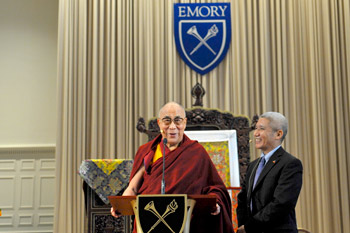
|
| His Holiness the Dalai Lama speaking to students at Emory University in Atlanta, Georgia on October 9, 2013. Photo/Sonam Zoksang |
“You have made me an honorary Professor, but I describe myself as a hopeless professor, because I am a somewhat lazy person and I haven’t done any homework.”
This drew much laughter from the audience.
“Day by day, if we watch television news, read the newspapers or listen to the radio, there is a constant stream of grim news about people being killed here and there. Many of these events are due to an excess of suspicion, anger and fear. They are evidence that human beings today are facing a moral crisis. Why is this? Because of a lack of real conviction in moral principles that would be a source of inner strength.”
He said there is a gap between appearance and reality that science and education try to close. In the past ethics, was the preserve of the church, but now that the influence of church and family values has declined, responsibility falls upon the education system. His Holiness quoted friends who agree that there is a moral crisis. In the USA, the greatest democratic nation on earth, the leader of the free world, he said the gap between rich and poor is growing, as it is in India and China. In such circumstances His Holiness feels that educational institutions have a responsibility to find a comprehensive solution.
“Here in my university, this hopeless professor can at least express a warm-hearted concern for the world.”
The dialogue between His Holiness and President Wagner that followed touched on several issues. His Holiness explained how he had learned the importance of not becoming attached to your own beliefs or field of study, because to do so blinds you to the qualities of other points of view. President Wagner wondered if this is similar to intellectual humility. Raj Patel wanted to know how to adapt the education system. His Holiness explained that work is going on to draft a school curriculum that incorporates secular ethics, that when it is complete, pilot studies will be undertaken. As it proves itself schools will be encouraged to adopt it.
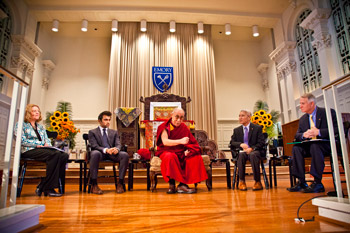
|
His Holiness the Dalai Lama during his dialogue with Emory President Wagner at Emory University in Atlanta, Georgia on October 9, 2013. Photo/Emory University
|
President Wagner noted that in his book ‘Beyond Religion’ His Holiness hardly uses the word ‘sacrifice’, which surprised him. His Holiness explained that sacrifice is clearly part of the method of compassion as when you sacrifice your own interests for the benefit of the larger community. An important issue is that such sacrifice needs to be voluntary; it’s not an obligation. In totalitarian societies however, people respond only because they will suffer a penalty if they don’t.
When a student asked what an ethical economic system could be, His Holiness laughed and said he was the wrong person to ask. However, he remarked that one of the reasons companies in Japan are so successful is because of the close relations between employers and employees. Another student referred to the large prison population in the USA and its tendency to reoffend. He wanted to know if a program of rehabilitation rather than punishment would be more effective. His Holiness spoke about the work Kiran Bedi, Governor of Tihar Jail in Delhi, India, had done to introduce educational programs including courses of meditation. He noted that there was a positive response among the prisoners there. He said it was a good question to have asked.
President Wagner came back to His Holiness’s suggestion that one religion could not satisfy the whole world, which is contrary to the view of more than one faith. His Holiness clarified that in the past it might have been the case that one truth, one religion in one country worked well. But today, in our interdependent, multicultural world we have to understand that while one truth, one religion may be appropriate for the individual, in terms of the wider community and humanity at large, it is only realistic to accept that we have several religions and several truths.
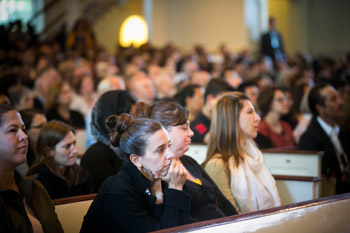
|
Emory University students listening to His Holiness the Dalai Lama at Emory University in Atlanta, Georgia on October 9, 2013. Photo/Emory University
|
He recalled his surprise once in Australia being asked by a Christian interviewer whether he believed in dinosaurs. He said “yes” because he had seen their bones. Only later did he discover that some people believe that creation took place 5000 years ago, after dinosaurs are thought to have walked the earth.
Finally, a student quoted her mother telling her that the purpose of life is to be happy and useful. She asked His Holiness what it means to be useful. He told her that our lives will be useful if we avoid harming other people and help them if we can.
During lunch at the Cox Ballroom the achievements of the Robert A Paul Emory-Tibet Science Initiative were celebrated. A short video including some of the activities in Dharamsala, India was shown. Faculty members were presented certificates of appreciation and several participants in the initiative shared their experiences with the gathering. Tribute was paid to His Holiness’s far-sighted inspiration as many of the Initiative’s substantial achievements in terms of programs designed, students trained, technical terms coined, textbooks designed and translations completed were outlined.
During the afternoon, an audience of 800 gathered to listen to a panel discussion involving His Holiness and Emory scholars from the Department of Religion and the Center for Ethics. Wendy Farley asked His Holiness what to say to her students who open their hearts to compassion and then can’t bear it. He explained that there are different levels of compassion. There is compassion that is a simple wish, ‘May these beings be free from this suffering’ and the more engaged intention to actually do something about it.
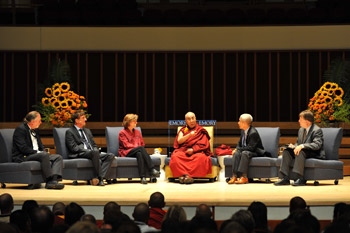
|
His Holiness the Dalai Lama speaking during a panel discussion at Emory University in Atlanta, Georgia on October 9, 2013. Photo/Sonam Zoksang
|
Philippe Rochat, a psychologist who worked with Piaget, wanted to know if His Holiness thinks we are born good or torn between good and bad. He said his research with children suggests to him that human beings have a multi-faceted, contradictory nature. His Holiness wondered if he had taken the different environments that children grow up in into account. He speculated that if human nature was largely negative, the human population would not be increasing.
“We have positive and negative emotions, which is why education is important. As human beings we can learn to cultivate some and reduce the others, which is not something animals can learn to do.”
Asked whether what they were discussing was a secular or a pan-religious ethic, His Holiness acknowledged that all major religions foster the practice of love. This practice is protected from anger and hatred by tolerance and forgiveness. It is protected against weakness by self-discipline and restraint. And it is protected against greed by contentment. These qualities that are held in common, respectful of all faiths and none, His Holiness said he refers to as secular ethics.
Tomorrow, His Holiness will give a Buddhist teaching when he explains Panchen Lobsang Chökyi Gyaltsen’s ‘Root Text of Mahamudra.’